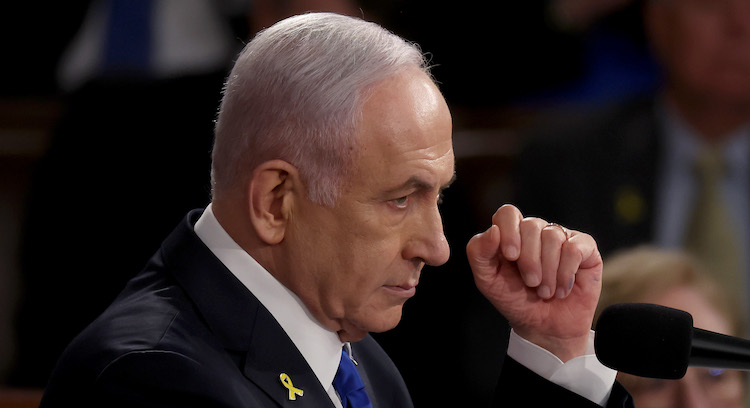From the beginning of Benjamin Netanyahu’s return to the premiership in 2009, he repeatedly insisted that the Palestinian Authority recognize Israel as a Jewish state. “Israel expects the Palestinians to first recognize Israel as a Jewish state before talking about two states for two peoples,” Netanyahu reportedly told Obama’s Mideast envoy, George Mitchell, at their first meeting.
Netanyahu never really let up on the demand, though he obviously let his government negotiate with Mahmoud Abbas’s team despite the latter’s adamant refusal to recognize Israel as a Jewish state, and therefore it wasn’t exactly a “precondition” to talks.
Netanyahu’s fixation on this divided the commentariat. His critics claimed he was simply trying to make it impossible for Abbas to come to the table and that the demand was intended as a roadblock to peace.
“I think it’s a mistake for some people to be raising it again and again as the critical decider of their attitude toward the possibility of a state and peace,” then-Secretary of State John Kerry said in 2014 when asked about the demand that Palestinians recognize Israel’s right to exist as a Jewish state. He added that “‘Jewish state’ was resolved in 1947 in resolution 181, where there are more than 30 mentions of ‘Jewish state.’”
Haaretz agreed with Kerry: “Netanyahu’s insistence on the declaration is designed to push Abbas into an impossible position…. Abbas cannot state publicly what Netanyahu is asking of him.”
Former Palestinian negotiator Nabil Shaath piled on: “Do you think that any Palestinian leader in his right mind can ever accept this or is this simply an attempt to make it impossible for any Palestinian leader to sign a peace agreement with Israel? This is a new torpedo for the blame game.”
The idea was that the PLO had “de facto” recognized Israel and that any final-status peace agreement would result in full recognition by the Palestinians and by the Arab states, so anything that got in the way of final-status talks was a distraction that put Israel’s desired recognition farther away.
The obvious counterpoint was that Palestinians’ refusal to accept a Jewish state was why those final-status negotiations never produced a Palestinian “yes.” After all, by the time Netanyahu took office in 2009, the Palestinians had been offered full statehood alongside Israel twice, and their various demands had been met. First Yasser Arafat and then Abbas rejected the offer anyway.
Additionally, recognizing Israel’s existence isn’t the same as recognizing its right to be the national home of the Jewish people. Israel doesn’t need anyone’s recognition in order to exist. “What it does need is for the Palestinians to truly and irrevocably recognize Israel as it is, not just the Israeli state, which has guaranteed its existence by achieving military superiority, but the legitimacy of its character,” as Chuck Freilich put it at the time. “Only when the Palestinians can bring themselves to do so, will Israel be confident that they are truly ready for peace, an end to the conflict and the painful concessions that will be required by all.”
It is clear now, more than 15 years after Netanyahu raised this demand, that Bibi was right and his critics were wrong. Rarely does an issue settle this neatly in the Middle East, but this one has.
In the years leading up to the most recent conflict, Palestinians seemed no closer to accepting the reality of Israel’s character, or even its permanence. “Instead, a majority of them say they prefer to reclaim all of historic Palestine, including the pre-1967 Israel,” wrote a polling analyst for the Washington Institute for Near East Policy in 2021, using a leading Palestinian pollster’s dataset. “A one-state solution with Arabs and Jews holding equal rights comes in second.”
But something else happened in that time: Western institutions began to back off of recognition of Israel as a Jewish state, encouraging the Palestinian rejectionists to dig in their heels.
In a less-noted but important moment in the congressional hearing heard around the world in December 2023, then-Harvard President Claudine Gay was asked by Rep. Virginia Foxx: “Do you believe Israel has a right to exist as a Jewish nation?”
Gay’s response was to deliberately remove the word “Jewish” from the formulation, saying: “I agree that the state of Israel has the right to exist.”
In other words, Gay doesn’t believe in Israel’s right to exist as a Jewish state—or at the very least, she will not admit that Israel has that right. That the president of Harvard University would take such aim at Israel’s raison d’etre in a public forum was momentarily shocking. But the outpouring of pro-Hamas sentiment and anti-Jewish violence at Harvard and elsewhere in the wake of the attacks made it less surprising in retrospect: The anti-Israel movement sweeping the progressive left at all levels of power has explicitly embraced the destruction of Israel as its organizing theme.
The better part of two years later, it garners only passing coverage that the surging progressive candidate for New York City mayor, Zohran Mamdani, mimics Gay’s formulation: “Israel has a right to exist as a state with equal rights.” When pressed to clarify, CNN reports, Mamdani’s staffer tried to stop the interview.
Sixteen years ago, Netanyahu’s demand that Israel be recognized as a Jewish state was seen as intransigent. It is clear now that this demand was not only reasonable, but that it should be asked of anyone inserting themselves into the conflict.


















